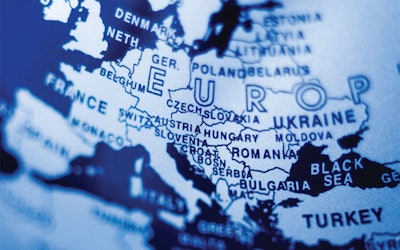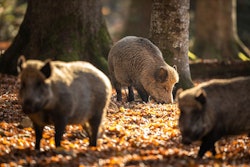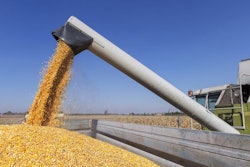
Several plans are underway across Europe to support pig farmers and bolster the pig meat market.
Across Europe, the pig meat sector is in long-term crisis from rising costs and low pork prices. A new support package is on offer to pig producers in Northern Ireland. Meanwhile, some processors have raised the prices they pay British pig farmers. In the European Union, a new group has been set up to examine the region’s pig meat market. Are these measures sufficient and in time to save the sector?
In Northern Ireland, a support scheme worth GBP2 million (US$2.6 million) has received a cautious welcome from the region’s pig farmers.
Introduced by Agriculture Minister Edwin Poots, MLA, the scheme aims to relieve the financial crisis that has been afflicting the sector over recent months.
According to the agriculture department, DAERA, contributing to the burden on pig farmers have been weak markets, rising feed costs, and difficulties in transporting animals from farm to slaughterhouse.
Under the scheme, beneficiaries of the support will be pig farmers whose animals have incurred price penalties between September 2021 and February 2022. Penalties were applied on animals outside the contract specifications. Often, pigs became overly heavy as a result of delays in transportation to the processor.
Affected farmers have been invited to apply for this support when the scheme opens in April.
“Many of the issues are due to factors outside the farmers’ control such as international supply and demand, labor availability in the processing sector, and repercussions of the COVID-19 pandemic,” Poots said. “This package will assist producers in the short term, but industry must work together and adjust to market signals for the longer term.”
Cautious welcome from pig industry organization
The minister’s announcement was welcomed by the Ulster Farmers’ Union (UFU).
According to its president, Victor Chestnutt, the UFU has been engaging with DAERA for several months regarding the ever-worsening state of the Northern Irish pork sector. In recent weeks, it has been pushed to breaking point by the local impacts of the Russian invasion of Ukraine.
While the support is welcome to alleviate losses already incurred, Chestnutt stressed that it will not help ease ongoing financial problems.
“The Northern Ireland pig industry is hanging on a knife edge,” he said.
To ensure the security of the region’s pork sector, he called on retailers to increase the prices they pay producers for pigs.
England’s pig farmers call for support
So far, similar calls for a government support package from the pig sector in England have not been rewarded, according to the National Pig Association (NPA). This is despite producers suffering the same unprecedented challenges, and ongoing deterioration in their businesses. NPA has requested financial support for producers from the United Kingdom (U.K.) agriculture department, Defra.
According to NPA, the latest support is the third for Northern Ireland, and schemes are also in place in Scotland, Ireland, France and elsewhere in Europe.
Already in the first half of 2021, British farmers typically lost around GBP25 per pig, according to the association. By the fourth quarter of the year, the loss rose to GBP39.
With the sector on the brink of collapse, some producers left the industry over the past six months. Others have cut back production. Those who remain are facing a recent jump in wheat prices from GBP215 to GBP300 per metric ton within a matter of days. Wheat forms the basis of U.K. pig diets.
Without the prospect of any financial support from Defra, NPA and pork processors have been calling on retailers to raise prices. So far, U.K. retailers have been reluctant to pass on price rises to consumers. In order to cover the costs of production, the price needs to be over GBP2 per kilo. Under current contracts, rates are around GBP1.30 per kilo.
Finally, at the end of last week, NPA reported that three large pork processors have announced increased rates — although only by GBP0.12-0.16 per kilo.
While these rises will come as some relief to producers covered by these contracts, those selling on the spot market will continue to struggle. Still oversupplied with heavy pigs, some buyers are offering as little as GBP1.00 per kilo for these animals.
Group created to examine EU pork sector
Last week, the European Commission held the first meeting of a new group. It will investigate the pig meat market in the European Union (EU).
Main functions of the European Pigmeat Reflection Group are to examine the sustainability and resilience of the sector in terms of socioeconomic, environmental, climatic, and animal health and welfare impacts. Members of this group include EC agriculture departments, stakeholders from agricultural markets, and experts from EU member states.
Among the difficulties facing the pork industry identified by the EC are prolonged COVID-19-related restrictions on hospitality and food service sectors, reduced exports to China, continuing spread of African swine fever, and dramatic rises in costs of production.
Lately, the Russian invasion of Ukraine has exacerbated the situation. All these factors highlight the sector’s dependence on imported feed ingredients, according to the EC. Furthermore, there is a need to identify new markets for European pig meat exports.
Under these market conditions, the group focused on the socioeconomic resilience of the sector at its kickoff meeting last week. The main topic was the dependence on imports of feed ingredients, particularly plant proteins.
Following this year will be another five meetings of the Reflection Group, each reviewing a different aspect of the pig meat sector. A final report with recommendations is scheduled for delivery early in 2023.
As the U.K. is no longer a member of the EU, it will be neither involved in nor impacted by this group’s recommendations.
Europe’s pig industry is not alone in being adversely impacted by Russia’s invasion of Ukraine. In the U.S., for example, corn prices have recently spiked, while soybean stocks have plummeted.
















